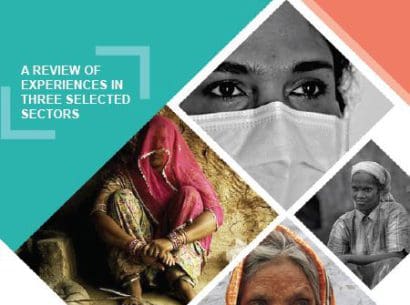
Report on Caste Gender Sexuality and Labor in the Pandemic
Advocacy, Care economy, Economic Opportunity & Security, Employment and Enterprises, Family Planning, Financial Inclusion, Gender-based Violence, Health, Intimate Partner Violence, Men and Masculinities, Mental Health, Migration, Reproductive Empowerment, Sexual and Reproductive Health and Rights, Sexual Violence, Violence Against Women and Girls, Women in the Value Chain, Women Peace and Security
A Review of Experiences in Three Selected Sectors
2022
 One of the key questions posed in our research within the Rebuild project is to understand how COVID-19 exacerbated pre-existing vulnerabilities for women in the urban informal economy. The backdrop of the pandemic has exposed many layers of social disenfranchisement and vulnerabilities. We situate vulnerabilities fundamentally within the context of historical marginalization and structural inequities that inhibit sections of the population to participate as equal citizens in civic, political and economic opportunities.
One of the key questions posed in our research within the Rebuild project is to understand how COVID-19 exacerbated pre-existing vulnerabilities for women in the urban informal economy. The backdrop of the pandemic has exposed many layers of social disenfranchisement and vulnerabilities. We situate vulnerabilities fundamentally within the context of historical marginalization and structural inequities that inhibit sections of the population to participate as equal citizens in civic, political and economic opportunities.
We also posit that economic and social vulnerabilities are tightly bound and form webs of vulnerability. A major cross-section of this web is influenced by caste, gender, and labor. Through this review, we intended to explore and showcase how occupational segregation based on certain social hierarchies continues to define who can participate in the economy, in what capacity and implications of this participation during a crisis, such as COVID-19.
Key Findings
- Unique vulnerabilities are faced by the sanitation sector workers given their historical marginalization and additional challenges of caste-based discrimination and low access to resources.
- The COVID-19 crisis enhanced the precarity of their lives multifold due to the nature of their work as well as that of the pandemic. Many lost their lives due to lack of safety tools, gloves, masks and sanitizers but no nationwide record is available for the same.
- Reduced earnings, increased isolation and social stigma during the pandemic impacted workers’ mental health. Efforts are required urgently to make mental services more accessible and affordable for the informal sector workers and urban poor.
- Like many other home based workers, bangle workers face unsanitary and hazardous working conditions and negligible benefits.
- The community of bangle workers technically is not formally recognized by the government. They lack a sense of community and organization, whereas Beedi workers with similar home based set up are recognized owing to the efforts of political organizations such as Centre of Indian Trade Unions (CITU) in Hyderabad.
- Sexual harassment of women is rampant within the sector in homes, community spaces and at the workshops. There is little to no redressal of the same as the women are not governed by rules framed by their contractors or SHGs owing to the informal nature of their work.
DOWNLOAD THE PUBLICATION BELOW
The learnings documented in this publication were collated as part of a three-country research study undertaken by ICRW Asia, REBUILD: COVID-19 & Women in the Informal Economy in Kenya, Uganda & India, with the support of the Bill & Melinda Gates Foundation and the International Development Research Centre. The facts and information in this report may be reproduced/quoted/cited only for non-commercial use and with appropriate attribution.

